Life keeps finding a way
In my original review for Jurassic World Evolution, I described the game as shallow and an overall mediocre park management game. I even ended on the note of “here’s hoping Frontier Developments continues to support the game in the coming months because what’s here right now is just a skeleton of a game waiting to be fossilized.”
Well, they went and did exactly that. From fossil to fully fleshed out, Jurassic World Evolution went on to be a much better game than it was at launch, thanks to a plethora of new content and improvements from Frontier Developments. However, when the sequel announcement popped up earlier this year, admittedly, I was surprised. I thought for sure that’s the last Jurassic World game we’d see for a good long while.
So, here we are, and I’m happy to say — for the most part — Jurassic World Evolution 2 is far better than its predecessor was at launch.
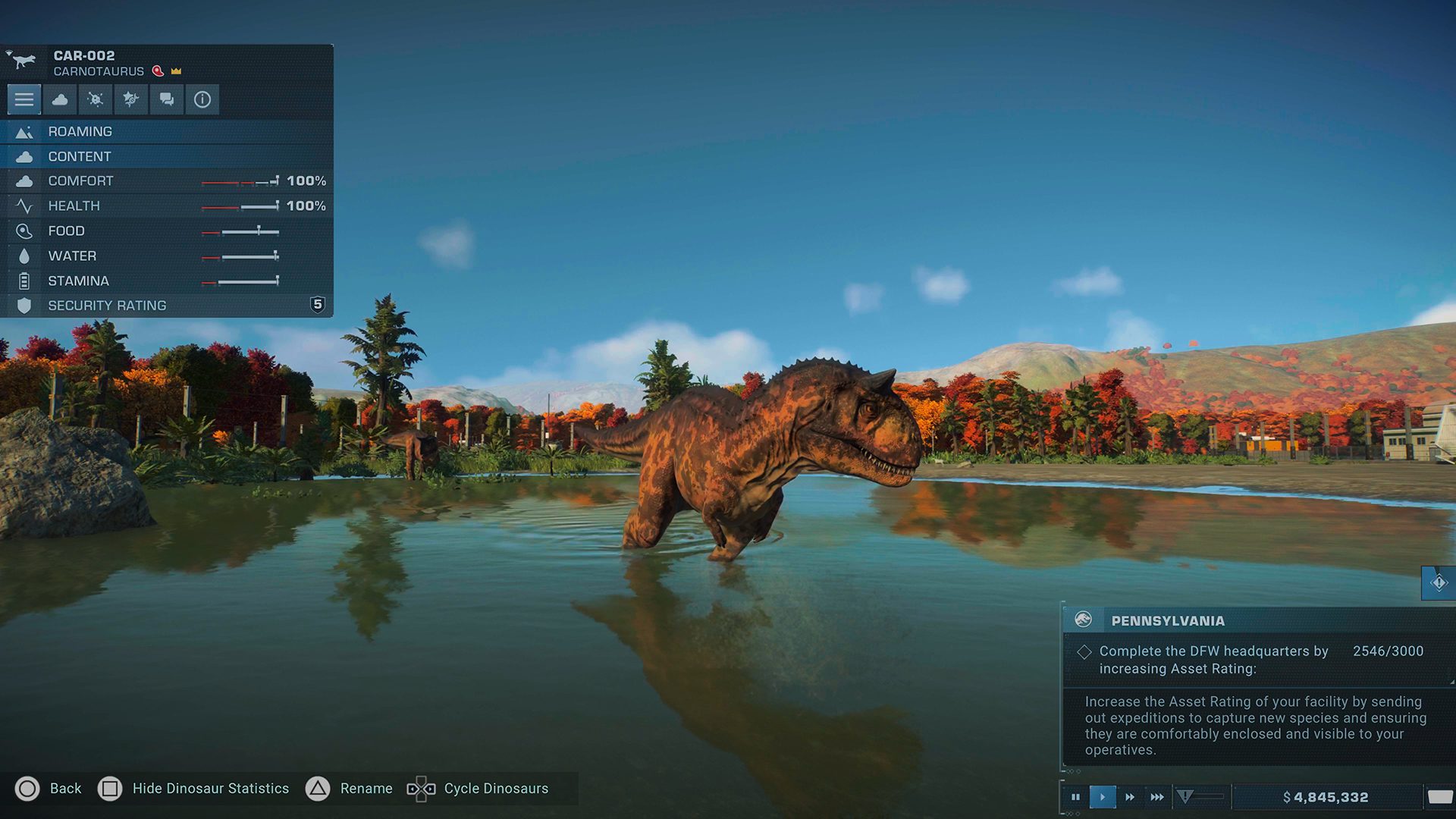
Jurassic World Evolution 2 (PS5 [reviewed], PS4, Xbox Series X/S, Xbox One, PC)
Developer: Frontier Developments
Publisher: Frontier Developments
Released: November 9, 2021
MSRP: $59.99
The key comparison here is specifically at launch. The original game is now reasonably polished all around. In contrast, Jurassic World Evolution 2 feels like it’s all over the place in terms of gameplay complexity, length, and narrative. On that last note, let’s start with the incredibly brief campaign mode.
Set after the events of the latest film (Jurassic World: Fallen Kingdom), dinosaurs are pretty much let loose all across the United States, and you’re tasked with helping the conservation efforts. Essentially, with the help of the Fish and Wildlife services (yes, really), you’ll be capturing and re-homing problematic dinosaurs across several different biomes set in the US. From Washington state to Pennsylvania, you’ll be taking pictures, tranquilizing, and moving dinosaurs into fenced-off enclosures of your creation and learning the basics of taking care of them.
The campaign mode in Jurassic World Evolution 2 is pretty much a brief tutorial on how to handle your dinosaurs with a fun in-universe narrative spin thrown in. Once again, Jeff Goldblum reprises his role as Dr. Ian Malcolm and delivers some of the best commentary and narration in the game. Other characters from Jurassic World make an appearance again, such as Claire (voiced by Bryce Dallas Howard) and Owen, who some random dude voices because Chris Pratt is too busy being Mario and Garfield.
The overall story has some interesting moments (such as working with the CIA to prevent dinosaurs from entering Canada). Still, my biggest issue is that it ends out of nowhere with no actual resolution. It comes off feeling more like an epilogue from the last game than a natural continuation. In general, this whole mode can be wrapped up in the span of three-to-four hours. I suspect there will be more to the campaign and various modes once the latest movie (Jurassic World: Dominion) is out next year.
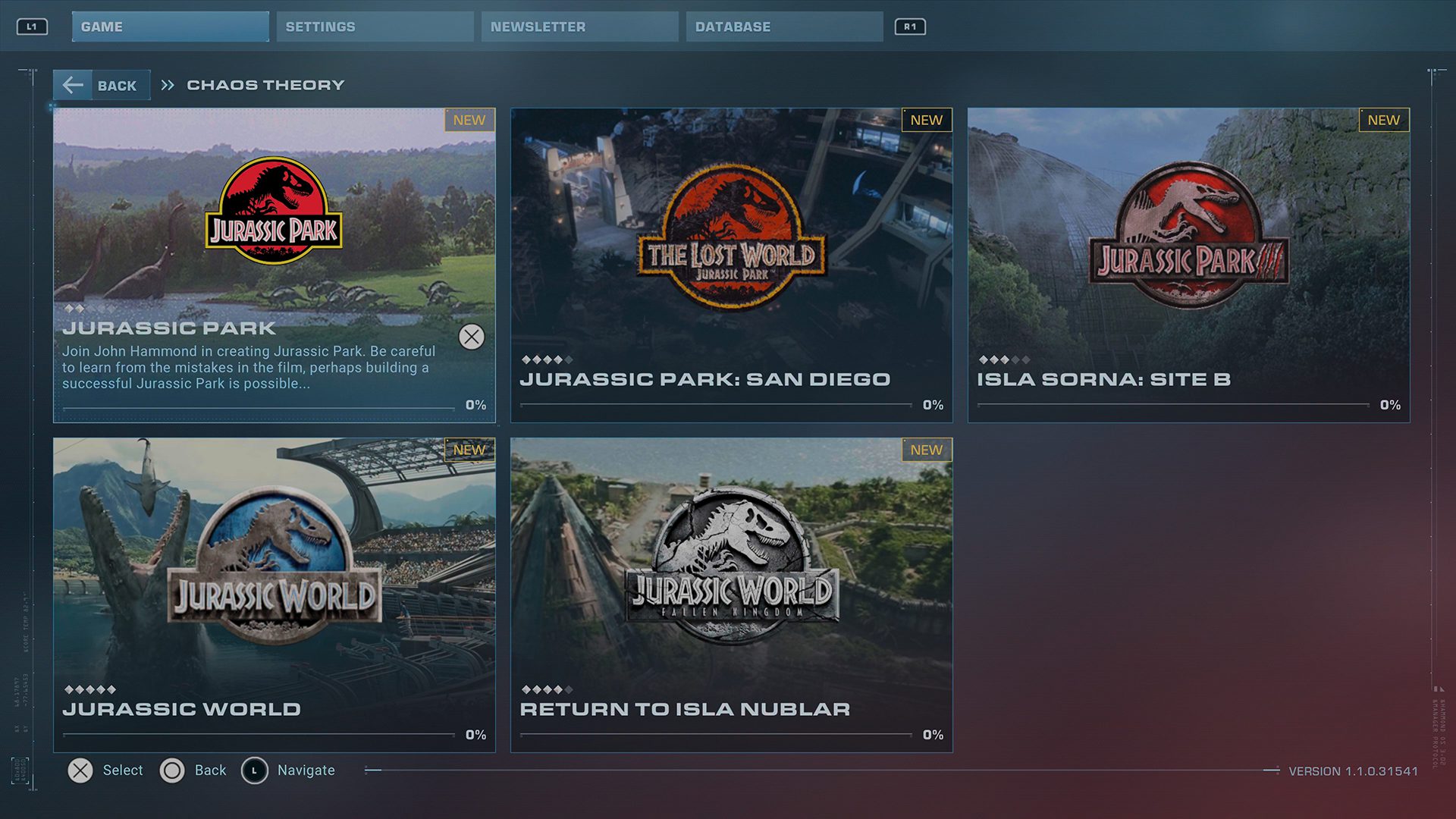
Hell, there’s even a convenient big blank spot in the Chaos Theory menu when you’re selecting which movie what-if scenario you wanna tackle that you just know is where the Dominion take on this is going to be.
On that note, though, let’s talk about the Chaos Theory mode — because outside of the sandbox mode, I’d argue this is the meat and potatoes of the whole game. To sum it up, you’re essentially tasked with fixing or avoiding the disasters that happen throughout the various movies and, instead, turning them into successful dinosaur theme parks.
It’s in this mode, though, where I think a lot of the improvements and added detail that Frontier Developments have done for both the dinosaurs and park management aspects make Jurassic Word Evolution 2 shine and make it an obvious step-up from the original game. The dinosaurs, in particular, look stunning. Admittedly, they were reasonably impressive looking in the original. However, these are a step above in all-around attention to detail, animation work. I think the resolution boost from the new consoles goes a long way here as well.
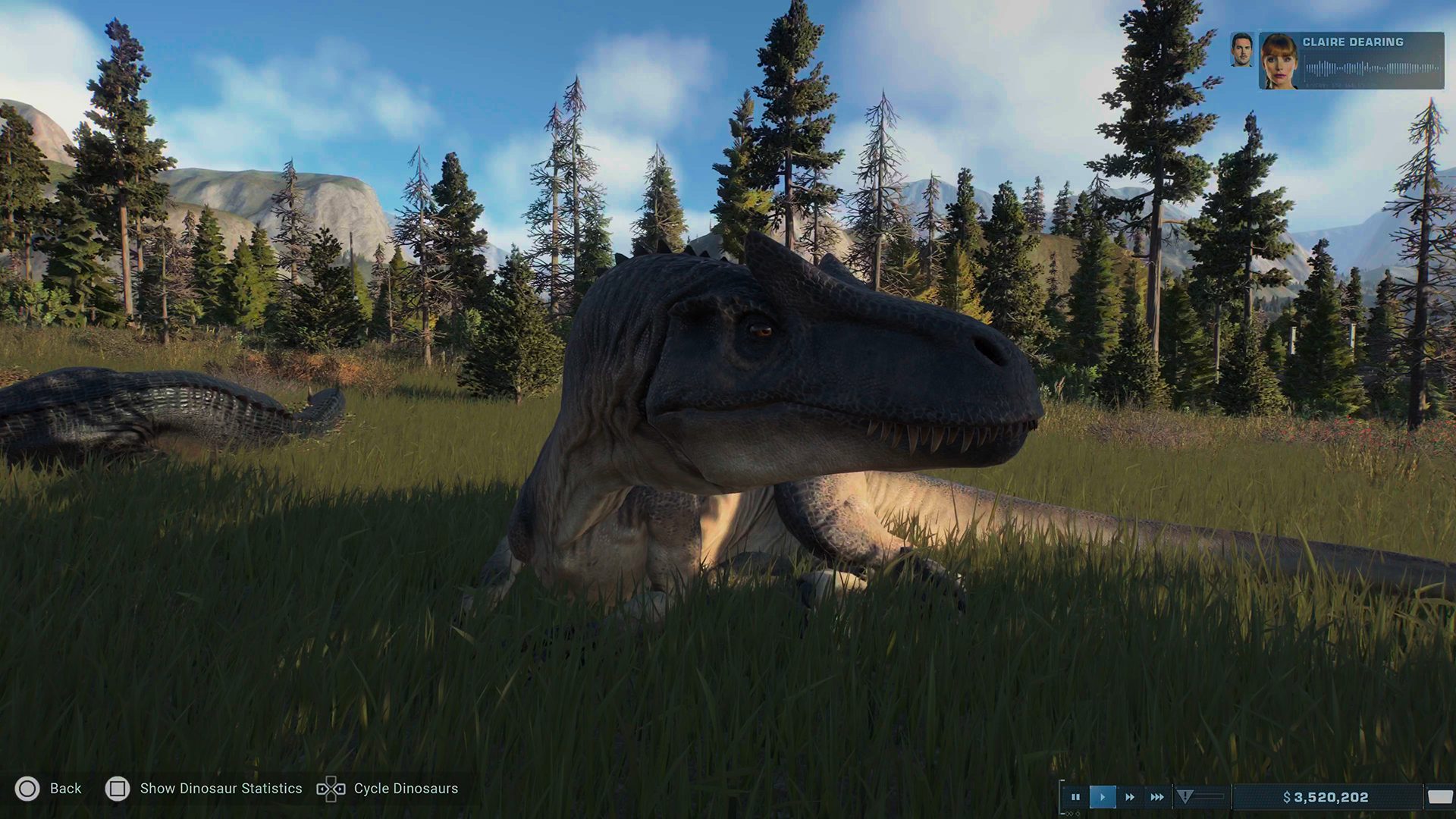
There’s also a ton of them this time around (79 to be exact, with five more included in the deluxe edition). I couldn’t spell or properly pronounce half their names if my life depended on it. I also maybe only recognize like a quarter of these at best. Still, honestly, it made researching, sending out scientists to excavate, and ultimately releasing a shiny new dinosaur I’ve never heard of before into an enclosure fun and addicting in a messed-up crime against nature gameplay loop that I appreciate.
Dinosaurs also have different behaviors and needs you need to keep track of and be aware of this time around. This also includes their enclosure and the environment around them. Different dinosaurs need anything from different types of plants and food to even space requirements and cohabitation limits. You can’t just throw in a bunch of herbivores into a single enclosure and call it a day. Some may need tons of forest coverage and fruit, while others might prefer nuts and ground grazing. All of this takes up precious space, so you’ll want to plan out these pens in advance before hatching specific dinosaurs.
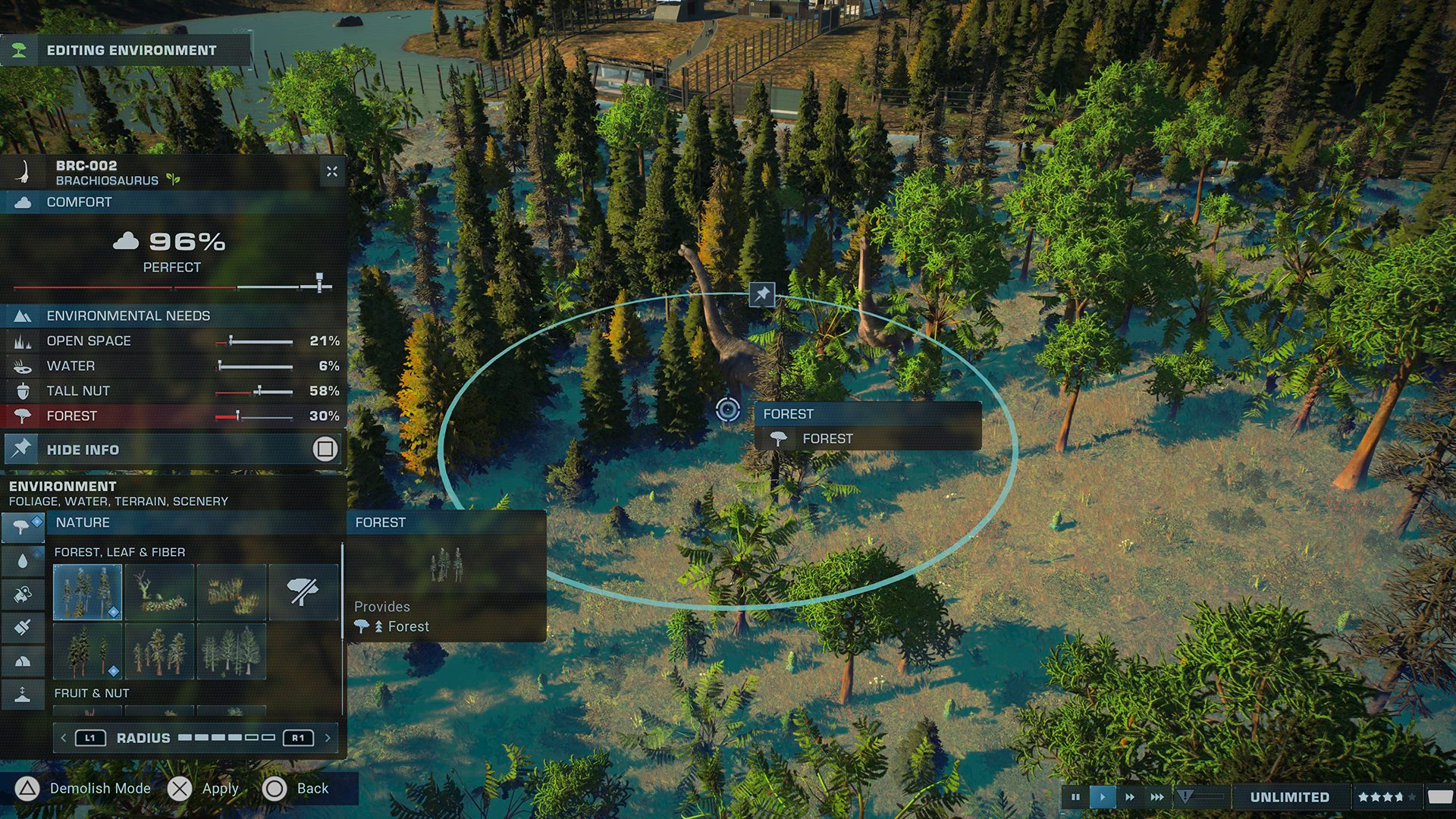
That goes double for big predators. The moment they’re unhappy, your guests behind your low-security fences will go from “Oooh, ahhh” to screaming and running.
Genomes and DNA tampering play a big part in the creation of your dinosaurs and how they behave. Depending on how much research you’ve done and how well trained your science staff is, your batch of dino eggs can have plenty of both positive and negative traits tied to each dinosaur.
For example, my first batch of velociraptors were all 30% more aggressive (meaning they were more likely to attack staff who occasionally do wellness checks from the safety of vehicles). However, on my second batch, by some miracle, I managed to create one that was completely docile towards staff. These perks also vary from the diet (requiring more water or specific food as an example) to even being more susceptible to disease.

There are also both flying and aquatic dinosaurs now that require unique pens (aviary domes and giant pools of water, basically) that I think add a nice visual variety to your parks. However, it’s in the parks themselves, and the more complex management systems that I believe make Chaos Mode far better than the campaign mode. I could just list off various mechanics and reasons why like I did with the dinosaur stuff, but instead, let me tell you a tale of both a failed and successful park that I think highlights both the management mechanics and the Chaos Theory mode perfectly.
My first attempt at making the original Jurassic Park a success started off pretty normal as I followed the tutorial in placing various buildings in the park, hiring my staff of scientists, researching the basics, and learning the basics. However, after successfully beelining my way to breeding a tyrannosaurus with no expense spared (quite literally draining most of my income in the process), I had one major task left: Create a five-star park.

I figured now that I had the tyrannosaurus sorted, money and guests would just come flowing in, and I’d be on my way to completing this first part of the Chaos Theory mode. After some story-related sabotage involving all my gates mysteriously opening up, I dealt with the escaped raptors and re-opened my guest shelters. However, the whole ordeal put me into the red in terms of money. So, naturally, I just sped-up time in the hopes my tyrannosaurus would draw folks back in, and I’d recoup my money.
After waiting around a bunch, it accomplished exactly that. Not a lot, but enough to breed a batch of new raptors I desperately needed after mine all died from old age (they’re the first dinosaur you produce in this specific mode). So, after splurging all my money and releasing my new batch of raptors, suddenly, mother nature decided it had enough of my rule-breaking and released a hurricane on me.
Different biomes have different weather, including extreme weather events like tornadoes, blizzards, and so forth. This wasn’t the first time I dealt with a hurricane, with the first one only causing minor damage to my park, and again, I just sped up time to recoup enough money to get me out of the red.
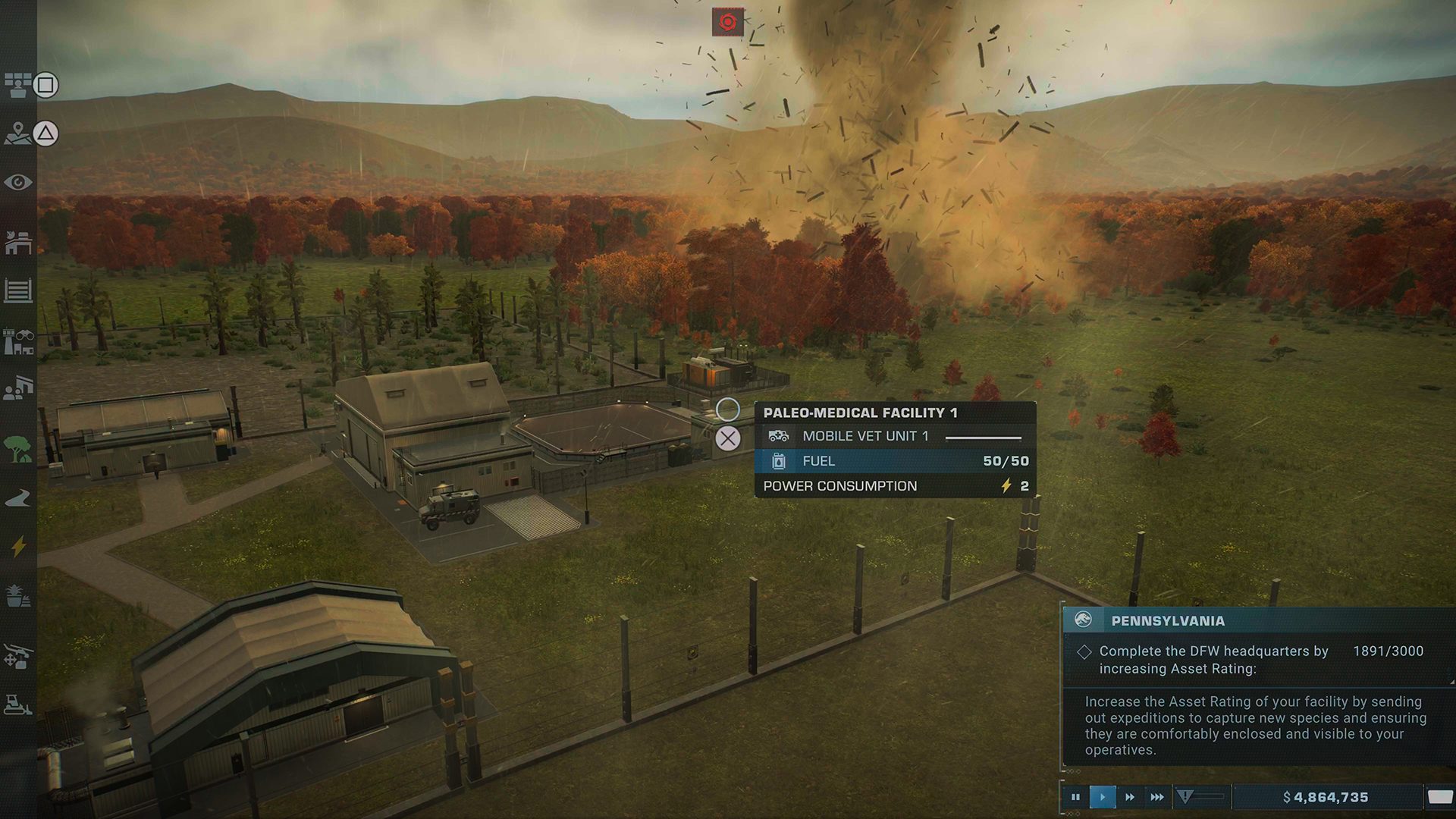
This time, however, it was far worse. There were multiple fences broken, multiple dinosaurs escaping (including those raptors I just released), and even that tyrannosaurus I spent hours saving up for. By the time the hurricane was over, I was around two million in the red and straight-up couldn’t afford even to fix the fences that were broken all over my park. I had no choice but to either reload a save file or restart, but I decided to go with the latter and go in with a plan.
On my second attempt, I already knew that I had to research and release a tyrannosaurus to progress the plot along, so I decided to give this park a thrill-seeking theme and focus. You see, guests are broken up into different categories: General guests, luxury guests, nature guests, and adventure guests. The latter of which love high infamy dinosaurs (big predators and dangerous dinosaurs all around, basically).
So, knowing this, outside of the plot-related triceratops you have to include, I went all-in on researching big predators, with the tyrannosaurus placed right in the middle of the park. I built wide pathways all around it, viewing galleries on every side of the enclosure, big ol’ steak houses, and other amenities equipped to cater directly towards adventure guests. This place was BIG DINOS EATIN MEAT, and my guests loved it.
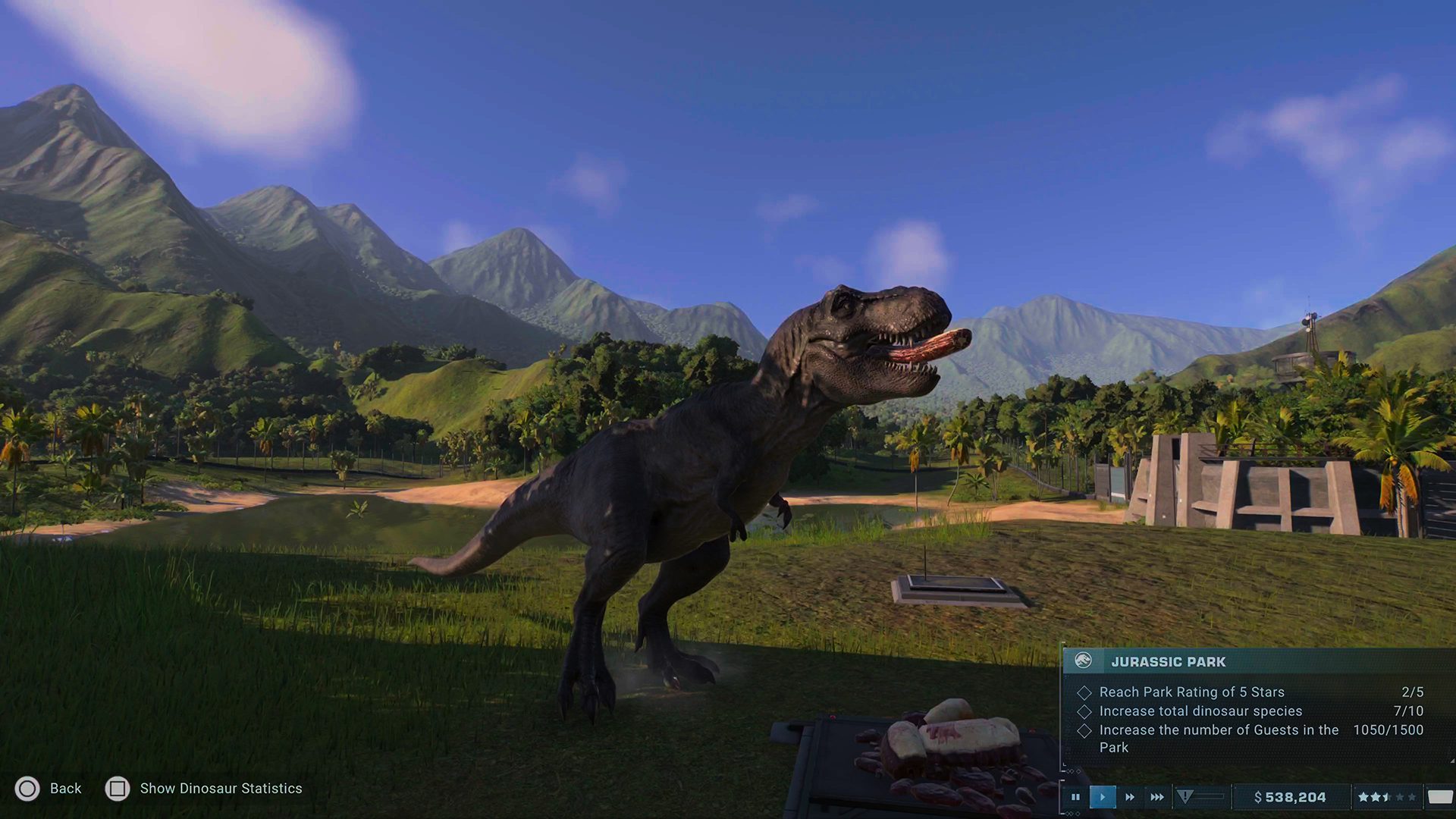
The money poured in, I spent it on researching high-security fences and upgrades all-around to my buildings to bring in as much money as possible, and I even survived my first hurricane with money to spare. I went in with a plan and a focus, and it paid off. It was incredibly satisfying to pull off, and a lot of that is due to the added complexity in Jurassic World Evolution 2. They took the criticism of shallow in the original and went, “fine, we’ll make it a swimming pool,” and it rules.
Admittedly, the game is very menu-heavy, though. It can be a task and a half clicking through all the various sub-menus and constantly assigning your scientists to multiple things. Your staff of scientists is used in everything from research to digging up bones and hatching the dinos themselves. They can even be overworked and require rest (I bet the developers loved adding that detail). However, as a result, it’s a whole lot of extra clicking and steps to get dinosaurs made, and I can easily see some folks being turned off from that.
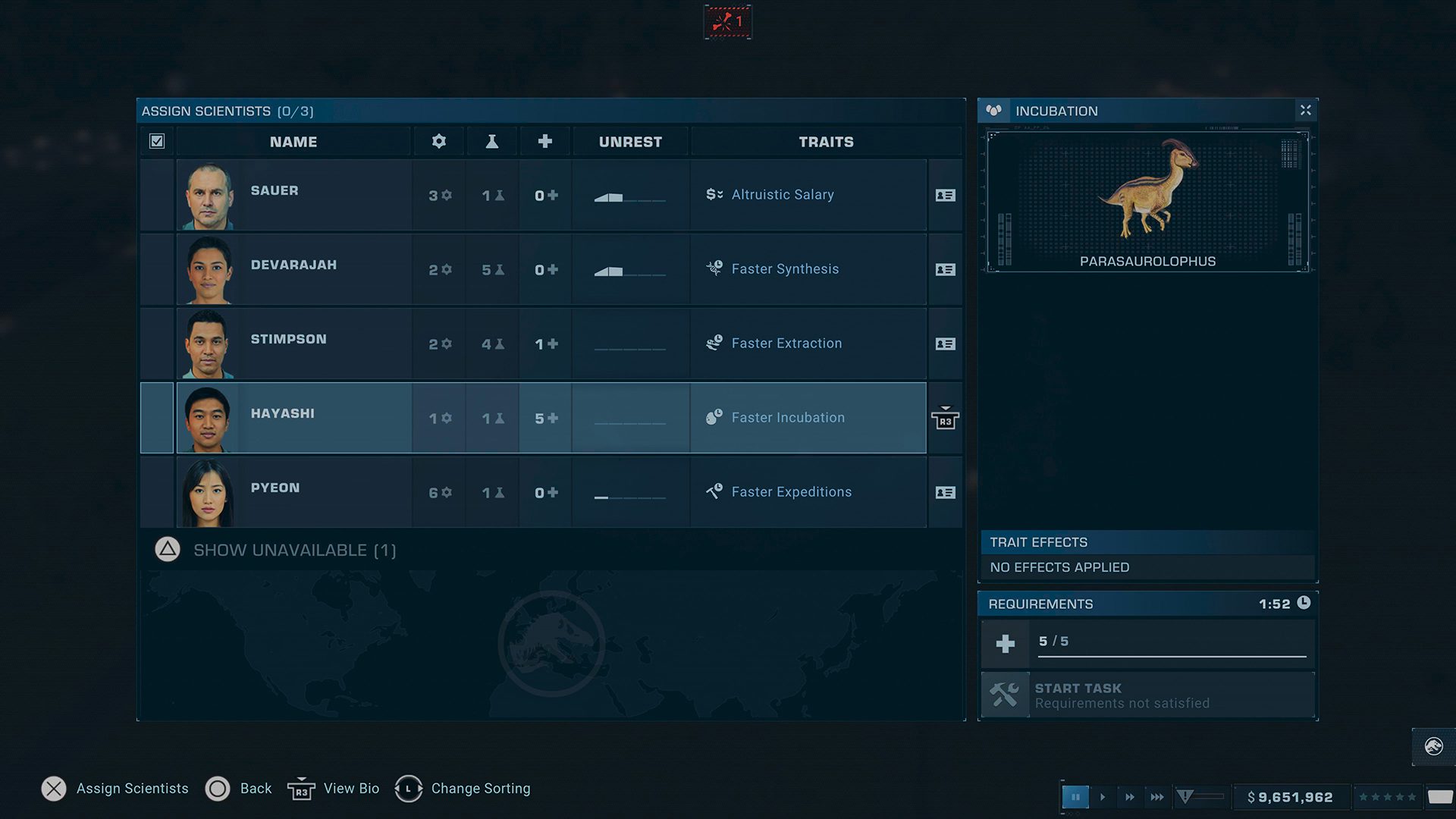
Outside of the Chaos Theory mode, there’s also a challenge mode, but admittedly I barely touched this and only completed the first challenge. It’s basically pre-made parks with different problems or in specific states of disaster that need to be fixed within a given timeframe or with a specific amount of money. Each challenge has different difficulty settings, but this wasn’t as interesting to me as Chaos Theory or the sandbox mode.
Sandbox is the endgame, and I think it will be the most appealing mode for people. It basically gives you tons of settings to play and toggle with (including unlimited money), letting you go wild in creating whatever type of park you want. However, at the very start of the game, all the different biomes, dinosaurs, and amenities are locked away until you’ve unlocked them by completing either the challenge or Chaos Theory mode.
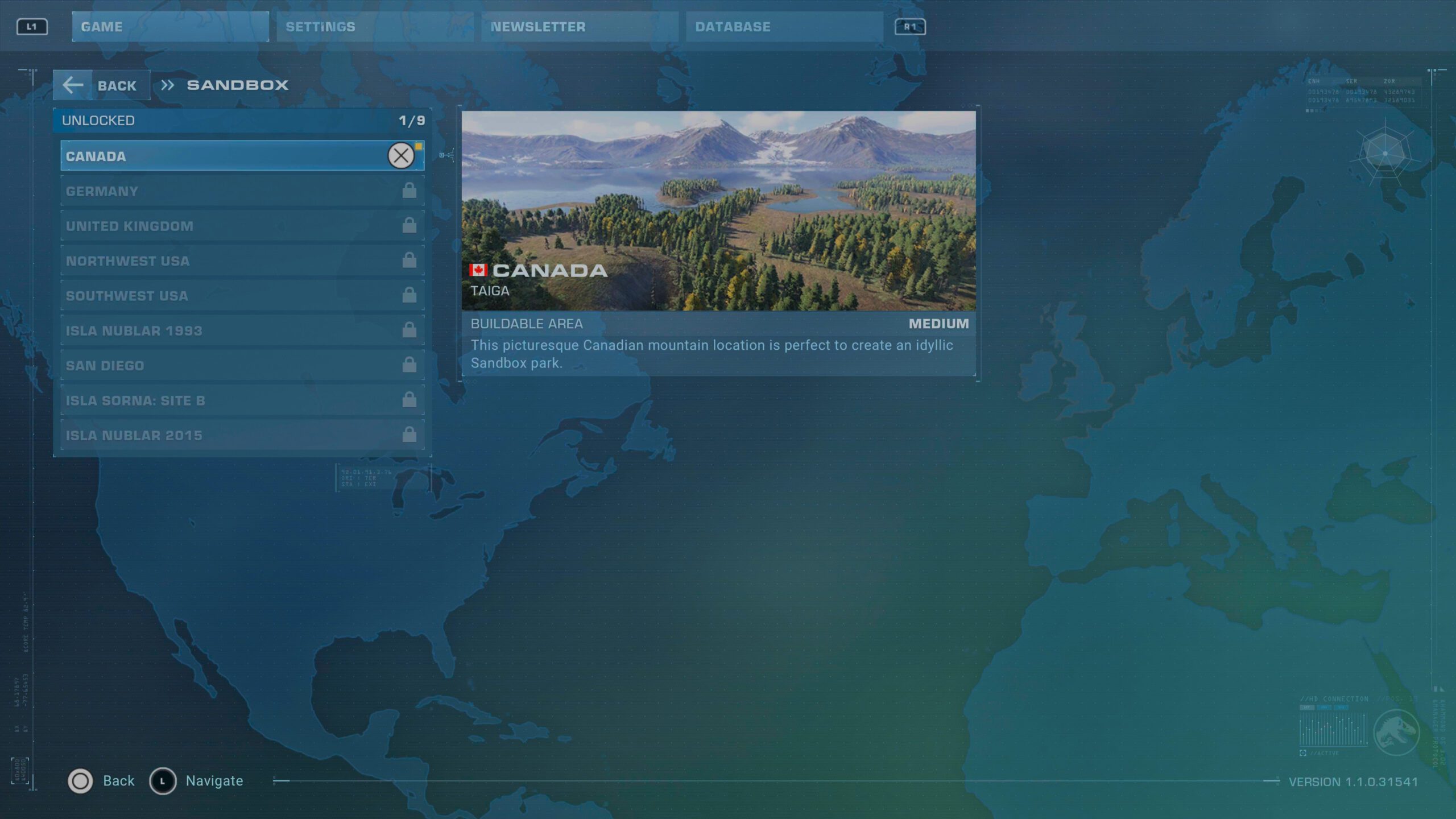
This has been a pretty divisive decision within the community, as a lot of folks just simply wanna dive right into creating their own unique parks or crazy dinosaur battle arenas. Honestly, to bring up another point from my review of the original: I think Frontier Developments should simply add in a cheat code or toggle that unlocks everything in sandbox. Maybe have it disable trophies/achievements on that save file or something; who cares! Let people have their fun.
To wrap things up, again, I think Jurassic World Evolution 2 is a much better game than its predecessor was at launch. That said, I can’t shake the feeling that much like the original, it’s only going to get better and more content-rich in the next coming year or so. It’s a beautiful trend from Frontier Developments that I think will make an already great game all the more excellent.
[This review is based on a retail build of the game provided by the publisher.]












Published: Nov 11, 2021 12:00 pm